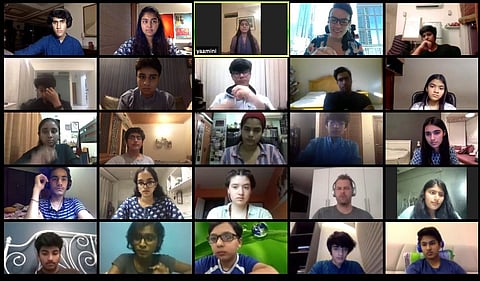

Looks like the lockdown has brought out the best in students. While a few were busy learning new skills, others were occupied with applying them to kickstart their entrepreneurial journey, dedicate themselves to a good cause or both. Here are three students, with their own individual initiatives, who came together to launch The Youth Symposium. This platform organises e-conferences with themes pertaining to the youth of this country.
Okay, we know what you are thinking. The lockdown has brought down upon us tons and tons of webinars, virtual summits, e-conferences and so on. But let it be known that The Youth Symposium goes beyond the conventional e-conferences and actually sets out to accomplish something. More on that later. First, let's meet the founders of the symposium.
The 17-year-olds from class XII in question are Aanvi Somany, Suhanee Giroti and Dhruv Bindra, students of The Shri Ram School, New Delhi who are batchmates and good friends. When they realised that just like them, there are several youngsters who suddenly have a lot of time, thanks to the lockdown they came up with an idea not only to keep themselves engaged but keep the youngsters across the world occupied too. That's how The Youth Symposium came to be. "We wanted to help channelise the potential of the youth," says Dhruv, a serial social entrepreneur. Under this, the trio organise conferences that directly concern the youth.
And with their very first conference, they hit the jackpot. While the theme was The Role of Education in Improving the Environment, the keynote speaker was Rosalía Arteaga, Former Constitutional President of Ecuador. They also partnered with POP Movement (Protect our Planet) for the same. And with their first conference, they launched the symposium on April 22, that is, Earth Day. However did they manage to do this, we wondered out loud. "We sent several cold emails, reached out to many organisations and thankfully, heard back from the POP Movement and Arteaga's office," explains Suhanee Giroti, an enthusiastic environmentalist. “And for our very first conference, over 80 people joined in,” says Aanvi Somany who hopes to specialise in Biochemistry.
That policy brief beckons
So, wondering what that mysterious element we mentioned in the beginning that sets them apart from all other webinars is? It is the policy briefs they prepare at the end of the conference that are conducted on Zoom. Once the conference begins, the context and perspective is set and the keynote speaker speaks. Then, students are broken into groups via breakout rooms and together, they discuss and put together a policy brief which consists of their thoughts and action plans regarding the topic of the conference. "In spirit, we break down the broader question into smaller discussions centred around key stakeholders. We have extremely nuanced conversations about how to roll out solutions in the contexts of both developing and developed nations," the trio explain. Take for example their second conference, which was attended by 80 people from 40 countries, on What Role can the Government Play in Increasing Access to Healthcare, following were few of the thoughts presented in the policy brief:
- How can private hospitals help the government to ensure a high quality of healthcare in the country?
- What role can public hospitals play in ensuring high accessibility to healthcare?
- How can businesses through employee health insurance and CSR play a role in increasing access to healthcare?
- How can the government take special measures to ensure that economically disadvantaged communities are given access to high-quality healthcare?
Imagine students from different parts of the world coming together to listen to topics that concern them and then having the chance to discuss and put it in words what they would like to do about it. And these policy briefs are shared with several organisations too. Now, we know you are already waiting to hear about their third conference but it is in the works and if you follow them on Instagram, you'll find out soon enough.
Getting to know the founders
Coming to the individuals themselves, Dhruv launched the Foundation for Young Innovators to bridge the gap between start-ups and inventions/finds. Through his efforts, he invited submissions from students across India and on-boarded about nine CEOs to select and mentor the winners. "The 25 winners also received Coursera scholarships," he informs. Now, he is on the verge of starting the second edition and this time, it's called Project Mauka where he wants to focus on public schools too. Aanvi, apart from being an active member of Ek Mutthi Anaaj, an initiative to feed the needy, she is a budding young scientist who is researching tuberculosis. "I am focusing on the public sector side of things, loopholes in the field, where the private sector steps in and so on," she says. While Suhanee is sourcing floral waste from Delhi's temples and turning them into compost that is then being used in the gardens around the temple. "Currently, I am raising money to help vegetable sellers compost vegetables that aren't sold," she explains.
For more on them, check out theyouthsymposium.com
